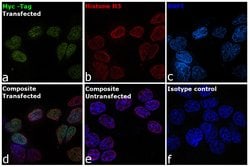Learn More
Invitrogen™ c-Myc Monoclonal Antibody (9E10), DyLight™ 488


Description
MA1-980-D488 detects c-myc protein and c-myc tagged proteins. MA1-980-D488 has been successfully used in fluorescent Western blot. DyLight 488 has an excitation/emission of 493/518 nm.

Specifications
Specifications
| Antigen | c-Myc |
| Applications | Western Blot, Immunocytochemistry |
| Classification | Monoclonal |
| Clone | 9E10 |
| Concentration | 1 mg/mL |
| Conjugate | DyLight 488 |
| Formulation | PBS with proprietary stabilizer and 0.02% sodium azide |
| Gene | MYC |
| Gene Accession No. | P01106 |
| Gene Alias | AU016757; Avian myelocytomatosis viral (v-myc) oncogene homolog; avian myelocytomatosis viral oncogene homolog; bHLHe39; c Myc; class E basic helix-loop-helix protein 39; cmyc; c-Myc; c-myc epitope tag; c-myc proto-oncogene; mMyc; MRTL; Myc; Myc protein; Myc proto-oncogene protein; MYC proto-oncogene, bHLH transcription factor; Myc2; MYCC; myc-related translation/localization regulatory factor; myelocytomatosis oncogene; myelocytomatosis viral oncogene homolog; Niard; Nird; Proto-oncogene c-Myc; RNCMYC; Transcription factor p64; v-myc avian myelocytomatosis viral oncogene homolog; v-myc myelocytomatosis viral oncogene homolog; v-myc myelocytomatosis viral oncogene-like protein |
| Show More |
Safety and Handling
By clicking Submit, you acknowledge that you may be contacted by Fisher Scientific in regards to the feedback you have provided in this form. We will not share your information for any other purposes. All contact information provided shall also be maintained in accordance with our Privacy Policy.




